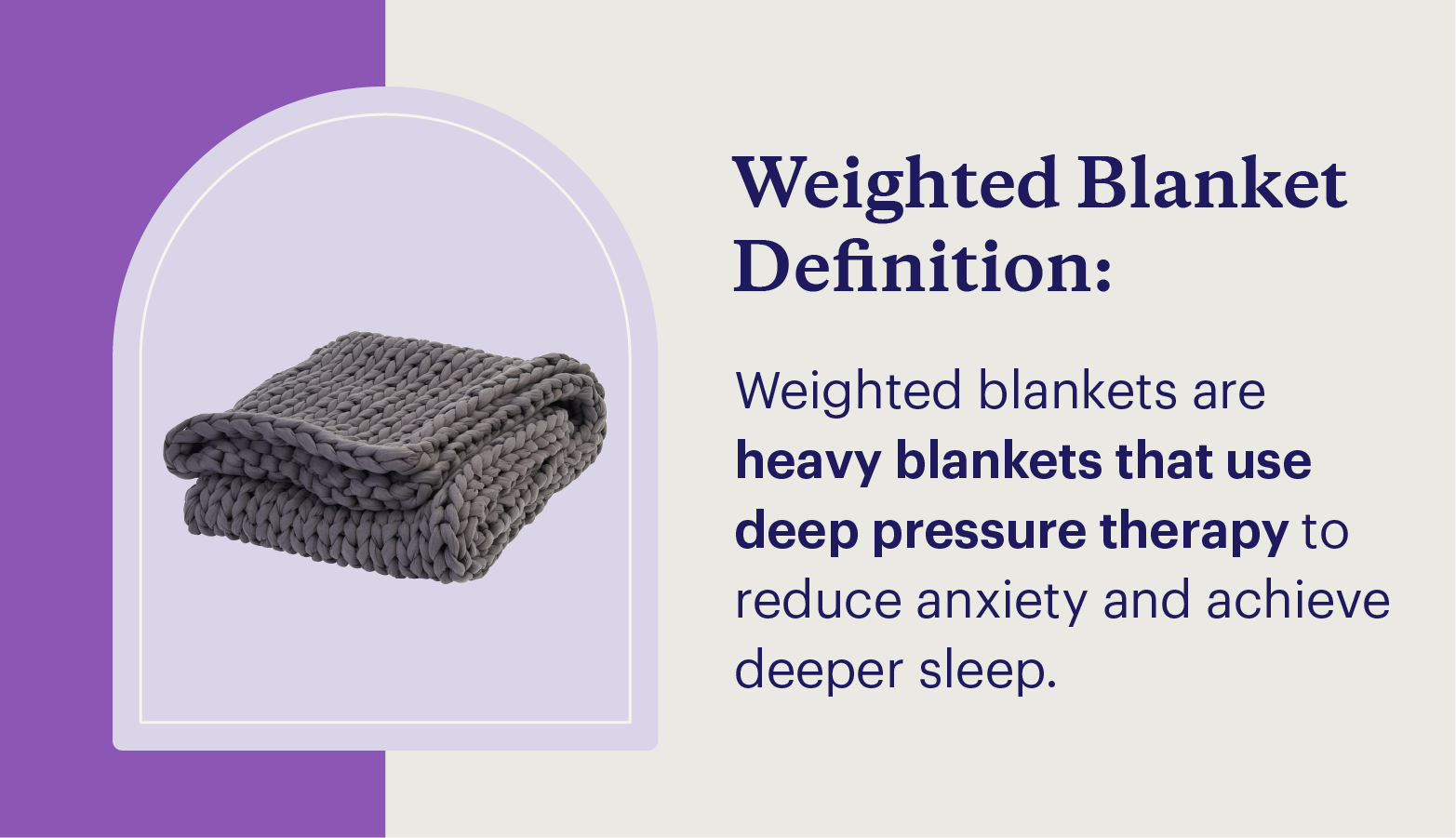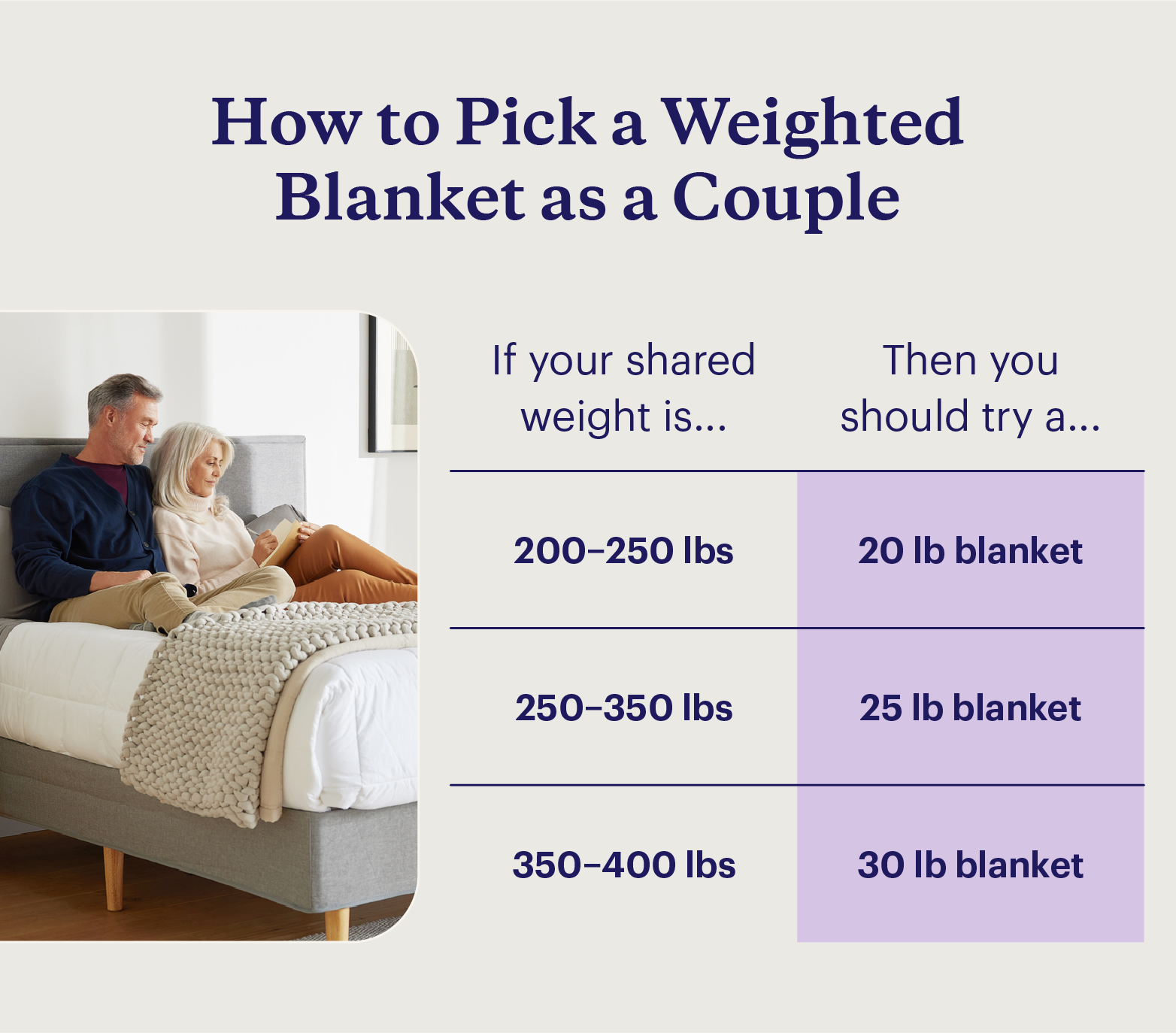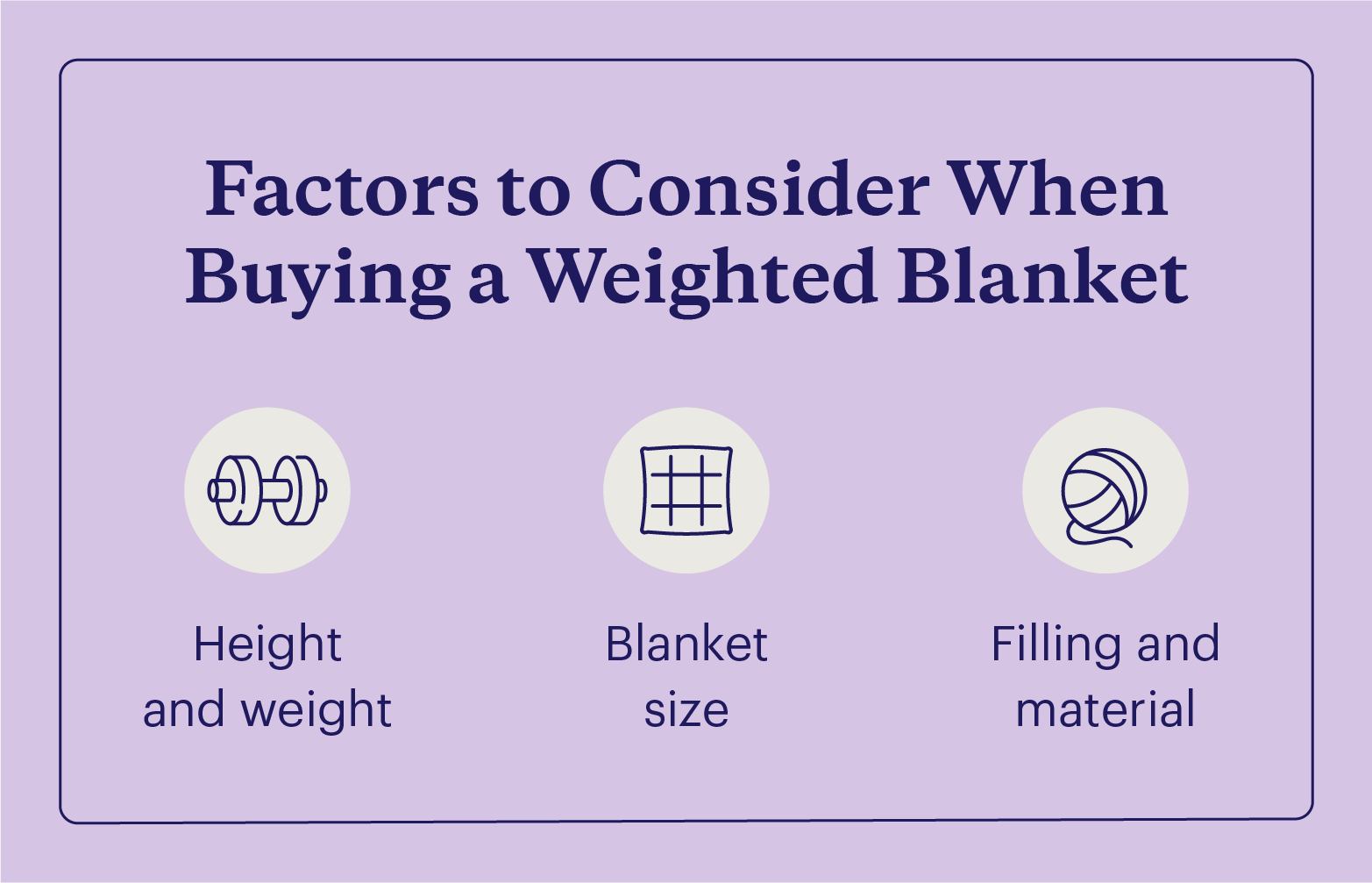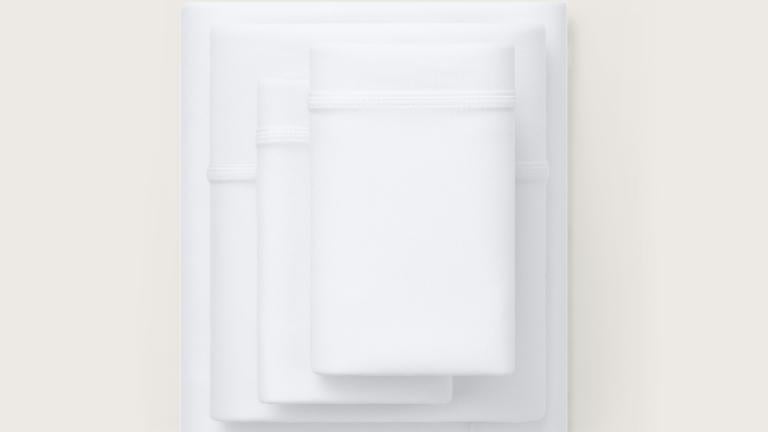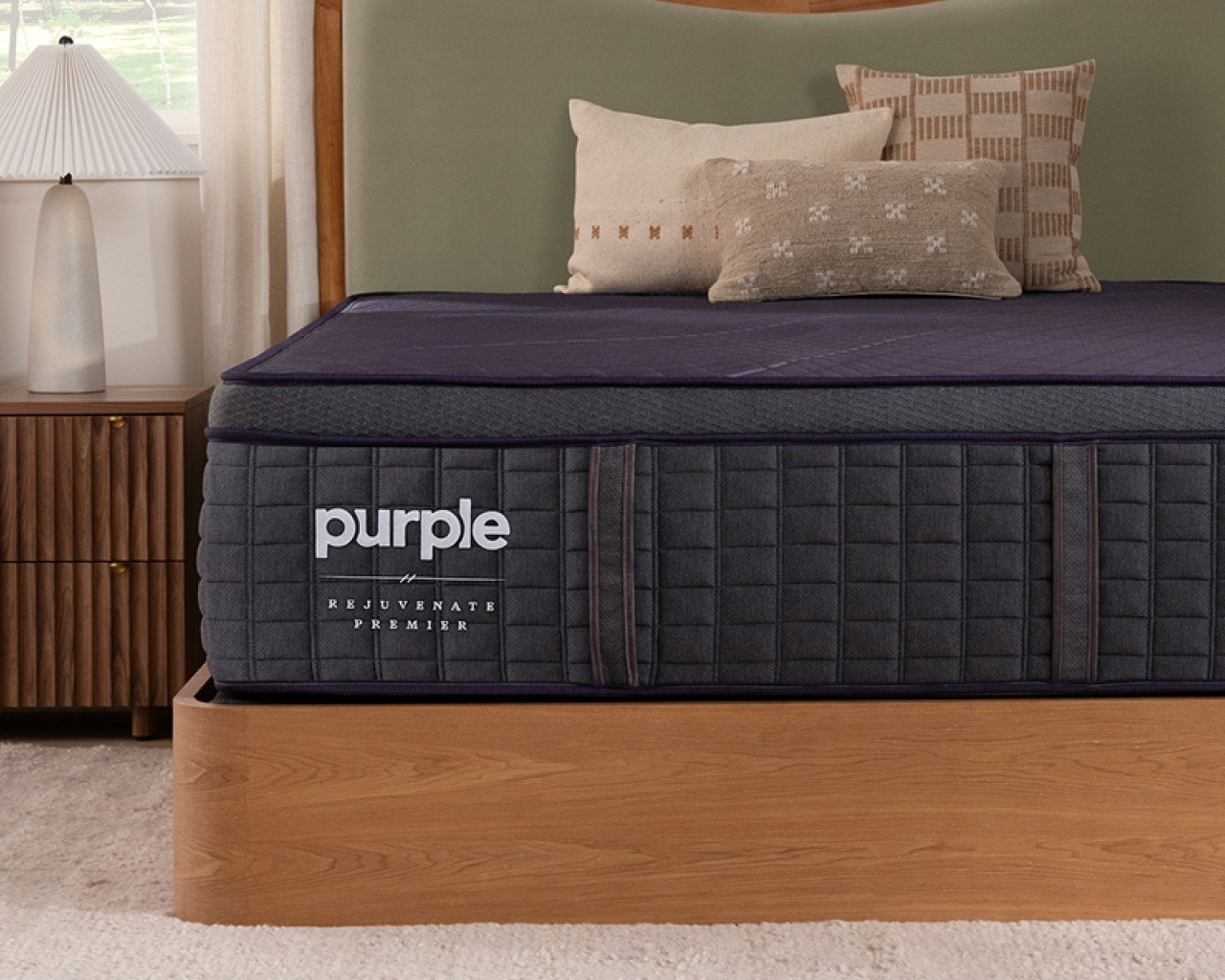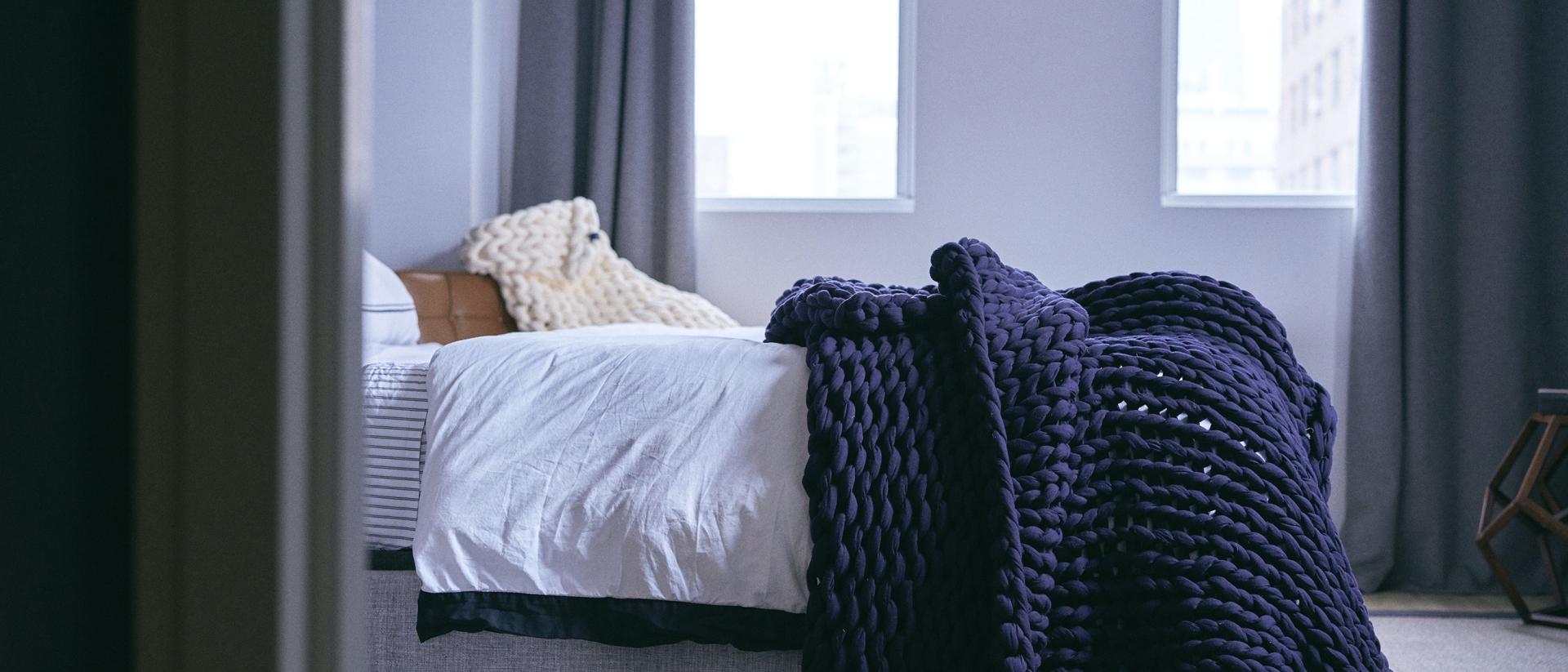
How Heavy Should a Weighted Blanket Be? A Comprehensive Weight Guide
Weighted blankets should be heavy enough to apply consistent pressure on users to aid sleep. On average, a weighted blanket weighs 10% of your body weight but can range from 5% to 12% of your weight. Ultimately, the right weight for you comes down to your personal preference for comfort.
Whether you’re looking to get deeper sleep or counter insomnia, a weighted blanket has been proven as a successful tool. With the added pressure of a weighted blanket, you can get deeper sleep, reduce nighttime anxiety, and feel more energized throughout the day. As a result, 78% of users use weighted blankets as their preferred way to calm down and sleep. But exactly how heavy should a weighted blanket be and which type should you buy?
Designed for sleepers of all kinds, Purple’s Bearaby® Weighted Blanket Is hand-knit from organic cotton yarn, with 20 pounds of evenly dispersed weight. Soft and breathable, this bestselling blanket promotes airflow and ensures year-round comfort no matter the season.
Read along to learn how weighted blankets work, how to choose the right one for you, and get answers to frequently asked questions.
What Is a Weighted Blanket?
A weighted blanket is a heavy blanket that uses deep pressure stimulation to calm sleepers and help them fall asleep quickly. They often contain sand, microbeads made of glass or plastic, or heavyweight cotton that adds pressure when sleeping under the blanket. This added weight has a calming effect and promotes oxytocin and serotonin production. These “happy hormones” put you in a relaxed state and promote deeper sleep.
Weighted blankets usually weigh between 5 and 30 pounds and are often made from cotton, polyester, flannel, linen, or bamboo. As a therapy tool, they can provide relief for sleep disorders and late-night anxiety. You could benefit from a weighted blanket if you have:
- Generalized anxiety disorder
- Insomnia
- Restless legs syndrome
- Depression
- ADHD
- PTSD
Benefits of Weighted Blankets
A weighted blanket promotes deeper, uninterrupted sleep for most people. Those with anxiety and sleeping disorders can use weighted blankets to calm their nervous system. Reducing stress hormones like cortisol and improving serotonin production leaves you feeling better at night and throughout the day. The other benefits of weighted blankets include:
- Increase melatonin production to relieve stress
- Less tossing and turning throughout the night
- Sharper focus and improved performance at school or work
- A general sense of happiness and calmness
- Alleviate issues associated with ADHD, ASD, and PTSD
Weighted Blanket Weight Guide
As a general rule, choose a weighted blanket that weighs about 10% of your body weight. That said, customers may prefer weights between 5% and 12% of their total body weigh, so choose a blanket that feels right for you. Here are a few weighted blanket considerations by customer group to keep in mind:
Weighted Blankets for Adults
Weighted blankets for adults generally weigh between 12 and 20 pounds. A blanket that’s too light won’t feel like it’s hugging your body. On the other hand, a blanket that’s too heavy won’t reduce stress or help you fall asleep. While the 10% rule is a good place to start, you may need a slightly lighter or heavier blanket for your ideal sense of comfort.
Weighted Blankets for Children
You can try giving children ages 3 and up a weighted blanket. That said, the 10% rule may not apply as well to children. While weighted blankets for children range between 3 and 10 pounds, you should consult your pediatrician to find the right weight. As a general rule of thumb, pick a blanket on the lighter side, especially for younger children.
One study by the Journal of Sleep Research found that weighted blankets help children with ADHD get better, deeper sleep. The National Institute for Health had similar findings for children with autism spectrum disorder (ASD). Whether or not your child needs a weighted blanket to sleep, many parents find the extra comfort worthwhile.
The American Academy of Pediatrics gives safe sleep recommendations regarding infants and weighted blankets. They specify: “It is recommended that weighted blankets, weighted sleepers, weighted swaddles, or other weighted objects not be placed on or near the sleeping infant.”
Weighted Blankets for Couples
When sharing weighted blankets, factor in the size of the bed and the shared body weight between you and your partner. King and queen size blankets distribute the weight over larger areas. As a result, a heavier blanket won’t feel as uncomfortable. However, a heavy blanket on a full size bed will apply more concentrated weight on less space.
To find the right blanket, add your weight and the weight of the person sleeping with you. From there, choose a weighted blanket that’s 10% of your combined weight. You may also want more or less weight depending on your mattress size. Alternatively, you and your partner can get separate blankets that feel comfortable for each of you.
Weighted Blanket Size Chart
If you still aren’t sure what size blanket works best for you, use the chart below. It compares body weight ranges and blanket weights to find the best fit.
| Body Weight Range | Blanket Weight |
| 50-70 lbs | 4-8 lbs |
| 70-90 lbs | 6-10 lbs |
| 90-110 lbs | 8-12 lbs |
| 110-130 lbs | 9-14 lbs |
| 130-150 lbs | 11-16 lbs |
| 150-170 lbs | 12-18 lbs |
| 170-200 lbs | 14-20 lbs |
| 200-300 lbs | 20-30 lbs |
| 300-400 lbs | 30-40 lbs |
| 400-500 lbs | 40-50 lbs |
Are Weighted Blankets Safe?
Almost all healthy adults can use weighted blankets without any health risks. If you have health problems involving your heart or lungs, a weighted blanket could become unsafe. Too much pressure can restrict airflow and make breathing more difficult. This same risk applies to infants, toddlers, and young children under 50 pounds.
While the majority of users have nothing to worry about, speak with your doctor if you have concerns about weighted blankets. To avoid risk, they may recommend you start with a lighter blanket or a different type of blanket altogether. If the added weight improves sleep, you can gradually move up to heavier blankets.
You may not get the most benefit from a weighted blanket if you have any of these conditions:
- Claustrophobia
- Respiratory disease
- Cardiac disorders
- Low blood pressure
- Obstructive sleep apnea
- Type 2 diabetes
How To Choose a Weighted Blanket
Getting the full benefits of a weighted blanket involves picking the right one for you. Different materials, weights, and sizes give varying levels of comfort. You also need to consider your height, weight, and mattress size. To help you choose the best weighted blanket, we’ll break down a few important considerations.
Shop by Height and Weight
Factor your height and weight into the size and heaviness of your blanket. Taller sleepers should pick a larger blanket that evenly distributes weight across their body. Conversely, if you’re on the shorter side, a smaller blanket will give more consistent pressure. Your weight is proportional to the ideal weight of your blanket.
Determine Your Blanket Size
Picking the right blanket size depends on the size of your mattress and the number of people who will use the blanket. As a general rule of thumb, pick a larger blanket if it will be spread over a wider area. On the other hand, a smaller blanket is perfect for individual use. You can use this blanket in bed or on the couch. At this size, you can even use it at a desk or draped around your shoulders to promote calmness.
Choose Your Filling and Material
Most weighted blankets contain beads, glass, or sand to weigh them down. While the materials do change the blanket’s feel, Purple’s Bearaby® Weighted Blanket is intentionally made with dense materials to achieve this effect without a filling. This lack of filling ensures our weighted blankets give even pressure and encourage natural airflow to make them ideal for any season.
When it comes time to choose a material, pick one that's comfortable for you. Generally, weighted blankets use soft materials like cotton, fleece, or linen. Our Bearaby® Weighted Blanket is made of 95% organic cotton and 5% spandex. The material may impact how you should wash your weighted blanket.
Can a Weighted Blanket Be Too Heavy?
Even if a weighted blanket sounds right for you, you might wonder what happens if you sleep with a weighted blanket that is too heavy. A heavy blanket can restrict airflow, reduce your comfort, and prevent better sleep. As a general rule of thumb, weighted blankets should be heavy enough to put noticeable pressure on you without restricting movement.
Purple's Bearaby® Weighted Blanket is the perfect weight for most adults. Try it out for yourself with our Self-Care Bundle. In addition to the weighted blanket, this bundle includes a Purple Harmony™ Pillow supported by the adaptive GelFlex® Grid. These breathable, heat-dispensing sleep aids give you the comfort needed for a restful sleep each night.
FAQ
Still have questions about how heavy your weighted blanket should be? To keep you informed, we answered a few common questions.
If you prefer a lighter blanket or have a low body weight, 12 pounds will give enough pressure. If you can’t decide between two weights, start with the lower weight category. For example, someone weighing 175 pounds might try a 15-pound blanket before a 20-pound one. If the lighter weight doesn’t help, you can move up from there.
For many users, 20 pounds is the perfect weight for their blanket. For those with an average body weight, 20 pounds may perfectly suit them. Of course, some people’s personal preferences veer toward lighter or heavier blankets.
Unless you have an extenuating health condition, you can use a weighted blanket every night. If you have concerns about your blanket, check in with your doctor.
More to Explore
Level-up your sleep routine with our most-loved products


